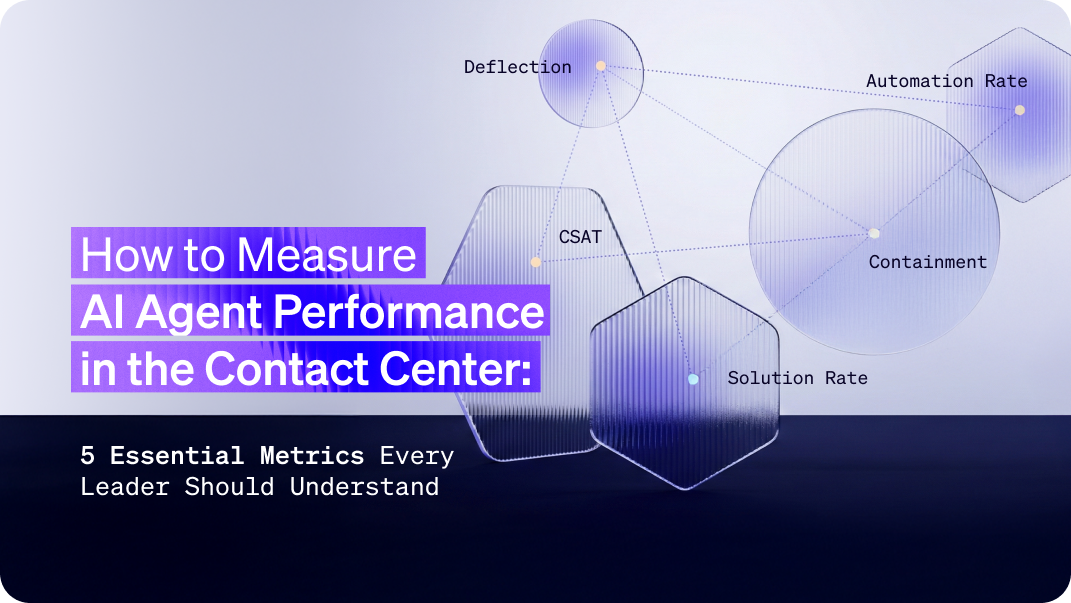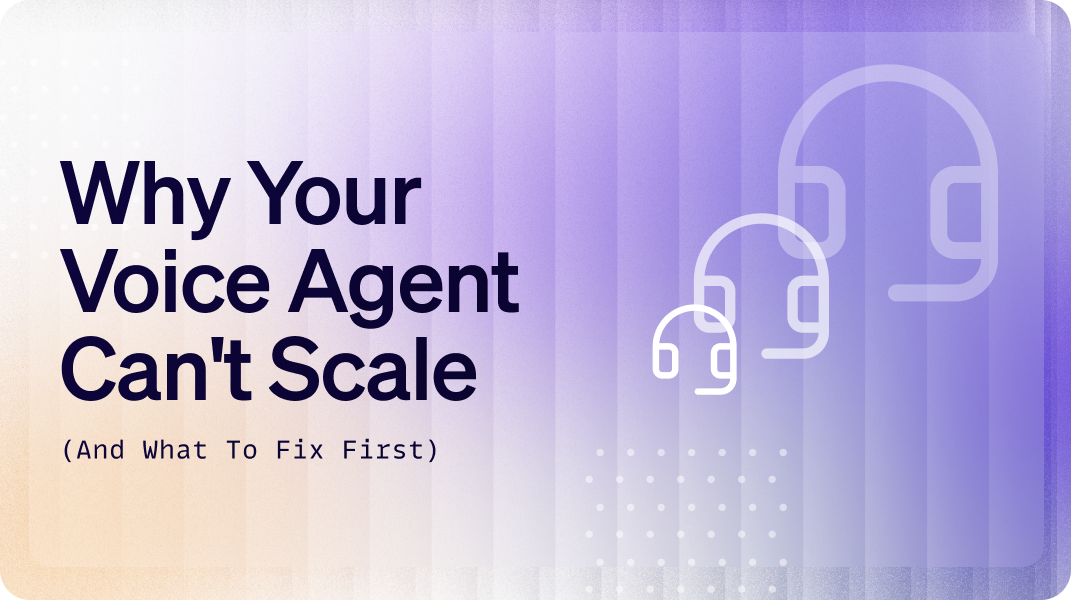Consider this: In a survey conducted by NTT of over 1,300 brands, 45% categorized customer experience as a top 3 differentiator for the 8th consecutive year. Furthermore, an Emplifi report states it only takes 2 bad customer experiences for 86% of shoppers to leave a trusted brand.
And that’s not all. Qualtrics looked at consumer spending behaviors and determined bad customer experiences could cost organizations $3.7 trillion annually.

Businesses cannot afford poor customer service or fail to meet customer expectations.
How can your call center meet the rising demands of today's consumers without escalating costs? As businesses everywhere feel the pinch, the solution might not be more staff but smarter technology. Enter conversational AI, a technology changing the game by automating interactions and streamlining customer service operations.
As the new entry point for customer interactions, this technology paves the way for a future where customer experiences are seamlessly integrated across all channels. Instead of navigating a maze of disjointed experiences, customers will find brands adapting dynamically to their needs, no matter where or when they reach out.
This blog will explore how Conversational AI can significantly reduce contact center expenses while enhancing the customer experience. From automating routine inquiries to providing round-the-clock support, discover the practical ways this technology can benefit your business right now. Join us as we break down the advantages and demonstrate the return on investment that AI-driven communication offers.

The High Cost of Traditional Call Centers
Many companies depend on different types of call centers as a key part of customer service efforts, yet they come with substantial costs and challenges. These centers rely heavily on human agents to handle customer interactions, which can be inefficient and expensive. Labor overheads often represent the largest part of the budget, and these expenses only grow as a business scales up to meet increasing demand.
Let’s take a look at some numbers, according to Cresta:
- Estimated operational expenditures to replace an agent: $10 - $20k
- Average agent ramp time: 3 months
- Average agent tenure: 14.3 months
Common issues include:
- High labor costs: Staffing requires significant investment in human resources. Salaries, training, and benefits all contribute to the high operational costs.
- Ineffective manual processes: Manual tasks such as handling inquiries, processing orders, and customer data entry are time-consuming and prone to errors, leading to inefficiencies.
- Difficulty scaling during peak times: Customer service centers often struggle to handle sudden volume increases, such as during product launches or promotional periods, without compromising service quality.
These challenges strain resources and suggest that traditional support hubs are only sustainable as primary customer interaction points with significant overhauls.
The Case for Conversational AI in Call Centers
As call centers deal with large financial obligations and scalability issues, conversational AI is a transformative solution. This technology is becoming essential for modernizing customer service frameworks in various industries because it can automate routine inquiries that usually require human intervention.
Here's why integrating intelligent virtual agents is essential:
- Handling common questions: Manage everyday customer queries such as balance checks, order updates, or basic troubleshooting, allowing call center agents to focus on complex issues requiring a personal touch.
- Improving efficiency: Speed up response times and minimize errors associated with manual processes by automating routine interactions and reducing the volume of calls reaching human agents.
- Enabling 24/7 support: Unlike human operatives, AI-powered assistants can operate around the clock without fatigue. When customer support is available anytime, it significantly boosts satisfaction and engagement.
- Scalability: Advanced conversational AI platforms like Rasa allow you to easily scale up to handle an increase in query volume without the need for proportional increases in staff.
By shifting the burden of routine tasks to AI, contact centers can allocate human resources more effectively, prioritizing complex interactions that require empathy and deep problem-solving skills. This strategic allocation improves operational efficiencies and enhances the overall customer experience, providing a clear return on investment.
Rasa’s CALM Approach: Balancing AI Advantages with Control
Maintaining a balance between innovative automation and essential control is crucial in the rapidly evolving landscape of AI conversational systems. For more information, see the Gartner® Market Guide for Conversational AI Solutions.
Rasa's CALM (Conversational AI with Language Models) framework addresses this challenge by combining the fluidity of AI-driven conversations with the rigorous demands of business logic and compliance.
Maintaining Brand Integrity While Leveraging Generative AI
One of the standout features of Rasa’s CALM approach is its ability to maintain brand integrity across all customer interactions. This is crucial for businesses that cannot afford communication deviations with their customers, especially when compliance and brand consistency are at stake.
Here’s how CALM empowers businesses:
- Control over conversations: Unlike AI models with high autonomy, CALM allows businesses to set parameters that guide AI decision-making. This ensures that all interactions are aligned with the company’s objectives, ethical standards, and regulatory requirements.
- Business logic integration: CALM integrates detailed business logic into the AI’s operating framework. This integration ensures that despite the assistant’s ability to generate responses dynamically, it does so within the context of the business’s rules and practices.
- Compliance and consistency: With CALM, enterprises can trust that their AI assistants will deliver high-quality, natural-sounding dialogues and adhere strictly to compliance requirements. To learn more, check out our whitepaper, Navigating Compliance in Regulated Industries with CALM.
- Fluid and controllable: Combining the natural conversational abilities of generative AI with strict control mechanisms, CALM provides businesses with the best of both worlds-superior conversational quality without sacrificing oversight.
- Seamless human handoff: This approach facilitates a smooth transition between AI and human agents when needed. This "human in the loop" approach ensures that while AI can handle most interactions autonomously, complex or sensitive issues are escalated to call center agents.
CALM represents a breakthrough in generative AI, empowering enterprises to deploy adaptable, high-quality AI assistants. Unlike traditional AI assistants, Rasa ensures that automated interactions are not only available 24/7 but also maintain or surpass the quality of conventional customer services.
This makes Rasa a practical solution for enhancing or even replacing customer service centers, addressing the common challenges of scalability, constant availability, and most importantly, conversational quality.
Read our e-book, Unlocking Business Potential with Conversational AI, to learn how this technology is making waves in the enterprise.
Calculating ROI with Conversational AI
Understanding the financial benefits of automated conversation tools is critical for businesses considering this technology. Measuring return on investment (ROI) helps justify the initial expense and ongoing overheads by highlighting tangible improvements in efficiency and customer service.
Key Metrics for Measuring ROI
To fully appreciate the value brought by conversational AI, companies should focus on several key performance indicators that reflect both direct and indirect benefits:
- Reduced response times: Faster responses improve customer satisfaction and increase the efficiency of handling queries, allowing more customer issues to be resolved per unit of time.
- Improved customer satisfaction: Measuring changes in customer satisfaction scores before and after deploying an AI assistant can provide clear evidence of the technology’s impact. Surveys, net promoter scores (NPS), and customer feedback are valuable tools for this assessment.
- Less live agent needs: Virtual agents can drastically reduce the need for call center representatives by automating routine inquiries and customer interactions. This reduction translates into significant labor expense savings. Measure your cost savings by comparing the expenses associated with contact center agents before and after AI implementation.
Long-Term Financial Health Indicators
Beyond these immediate metrics, conversational AI also contributes to broader financial health in several ways:
- Increased operational efficiency: Automating standard procedures and responses allows staff to focus on higher-value activities, which can improve overall operational efficiency. This shift often leads to reduced operational charges and better allocation of human resources.
- Decreased costs: Unlike traditional contact centers, the money needed to scale AI-driven communication does not grow linearly with increased demand. This scalability is a significant financial advantage, allowing businesses to handle higher volumes of interactions without a heavy financial burden.
- Revenue growth: Improved customer satisfaction can lead to higher retention rates, increased sales, and enhanced brand loyalty. These outcomes directly contribute to revenue growth, making them critical components of the ROI calculation.
By tracking these metrics, companies can comprehensively understand the financial benefits of automated conversation tools. This data supports continued investment in the technology and highlights areas for further optimization and improvement.
The Future of Call Center Technologies
As explored throughout this blog, conversational AI represents a transformative leap forward. This technology meets and exceeds modern consumers' expectations for speed and personalization by automating routine interactions and enhancing customer service capabilities.
It’s clear: The significant cost reductions by implementing intelligent virtual agents reshape financial outcomes in customer service operations.
Conversational AI offers a compelling strategy for businesses with high operational expenses seeking scalable solutions. It reduces the reliance on extensive live agent networks, mitigates costly errors from manual processes, and provides the agility to scale service dynamically in response to demand fluctuations.
Rasa’s technology, especially our CALM framework, ensures that businesses offer personalized, compliant, and controlled conversational experiences that reflect your brand's values and meet regulatory standards.
We invite you to discover how Rasa can empower your business to reduce costs, improve efficiency, and enhance customer satisfaction. Learn more about our solutions and take the first step towards transforming your business operations by visiting our website or contacting our team.
Gartner, Market Guide for Conversational AI Solutions, Gabriele Rigon, Bern Elliot, Adrian Lee, Danielle Casey, Justin Tung, Arup Roy, Stephen Emmott, Anthony Mullen, Uma Challa, 3 April 2024.
GARTNER is a registered trademark and service mark of Gartner, Inc. and/or its affiliates in the U.S. and internationally and is used herein with permission. All rights reserved.
Gartner does not endorse any vendor, product or service depicted in its research publications, and does not advise technology users to select only those vendors with the highest ratings or other designation. Gartner research publications consist of the opinions of Gartner’s research organization and should not be construed as statements of fact. Gartner disclaims all warranties, expressed or implied, with respect to this research, including any warranties of merchantability or fitness for a particular purpose.






